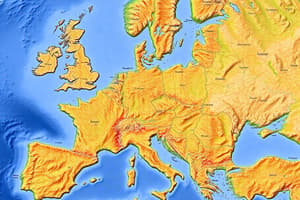Podcast
Questions and Answers
What is the primary function of a Geographic Information System (GIS)?
What is the primary function of a Geographic Information System (GIS)?
- To manage and allocate natural resources
- To analyze and display geographically referenced data (correct)
- To predict weather patterns and climate trends
- To study human populations and their cultures
Which of the following is NOT a key component of a GIS?
Which of the following is NOT a key component of a GIS?
- Hardware: computers, GPS devices, scanners
- Software: ArcGIS, QGIS, GRASS
- Data: spatial data and attribute data
- Climatological data: temperature, precipitation, wind patterns (correct)
What is the primary focus of Human Geography?
What is the primary focus of Human Geography?
- The management of natural resources and urban planning
- The study of human populations, their cultures, economies, and interactions with the environment (correct)
- The study of the Earth's physical systems and processes
- The analysis of geographically referenced data
Which of the following is an example of a GIS application?
Which of the following is an example of a GIS application?
What is Spatial Modeling in the context of GIS?
What is Spatial Modeling in the context of GIS?
What is the primary focus of economic geography?
What is the primary focus of economic geography?
What is the main difference between weather and climate?
What is the main difference between weather and climate?
What is the primary focus of cultural geography?
What is the primary focus of cultural geography?
What is the primary purpose of climate modeling?
What is the primary purpose of climate modeling?
What is the main focus of urban geography?
What is the main focus of urban geography?
Flashcards are hidden until you start studying
Study Notes
Geographic Information Systems (GIS)
- Definition: A computer-based tool for capturing, storing, analyzing, and displaying geographically referenced data.
- Key components:
- Hardware: computers, GPS devices, scanners
- Software: ArcGIS, QGIS, GRASS
- Data: spatial data (points, lines, polygons) and attribute data (tables)
- Applications:
- Urban planning and management
- Natural resource management
- Emergency response and disaster relief
- Transportation planning
- GIS analysis techniques:
- Spatial analysis: proximity, buffering, network analysis
- Spatial modeling: predictive modeling, suitability analysis
- Data visualization: mapping, 3D visualization
Human Geography
- Definition: The study of human populations, their cultures, economies, and interactions with the environment.
- Branches:
- Cultural geography: study of human cultures and their relationships with the environment
- Economic geography: study of economic systems and their impact on the environment
- Urban geography: study of urban areas and their relationships with the environment
- Political geography: study of political systems and their impact on the environment
- Key concepts:
- Place and space: understanding the relationships between people and their environments
- Scale: understanding the relationships between local, national, and global phenomena
- Human-environment interaction: understanding the reciprocal relationships between humans and the environment
Climatology
- Definition: The study of the Earth's climate, including its composition, properties, and dynamics.
- Key components:
- Atmospheric science: study of the atmosphere, including temperature, humidity, and precipitation patterns
- Climatic zones: classification of regions based on climate characteristics
- Climate change: study of changes in the Earth's climate over time
- Climatological concepts:
- Weather vs. climate: understanding the difference between short-term and long-term atmospheric conditions
- Climate classification: understanding the various classification systems (e.g. Köppen, Thornthwaite)
- Climate modeling: using computer models to simulate and predict climate patterns and changes
Geographic Information Systems (GIS)
- GIS is a computer-based tool for capturing, storing, analyzing, and displaying geographically referenced data
- Key components include hardware (computers, GPS devices, scanners), software (ArcGIS, QGIS, GRASS), and data (spatial and attribute data)
- Applications of GIS include urban planning and management, natural resource management, emergency response and disaster relief, and transportation planning
- GIS analysis techniques include spatial analysis (proximity, buffering, network analysis), spatial modeling (predictive modeling, suitability analysis), and data visualization (mapping, 3D visualization)
Human Geography
- Human geography is the study of human populations, their cultures, economies, and interactions with the environment
- Branches of human geography include cultural geography, economic geography, urban geography, and political geography
- Key concepts in human geography include understanding place and space, scale, and human-environment interaction
- Place and space refer to the relationships between people and their environments
- Scale refers to the relationships between local, national, and global phenomena
- Human-environment interaction refers to the reciprocal relationships between humans and the environment
Climatology
- Climatology is the study of the Earth's climate, including its composition, properties, and dynamics
- Key components of climatology include atmospheric science, climatic zones, and climate change
- Climatological concepts include understanding the difference between weather and climate
- Weather refers to short-term atmospheric conditions, while climate refers to long-term atmospheric conditions
- Climate classification systems include the Köppen and Thornthwaite systems
- Climate modeling uses computer models to simulate and predict climate patterns and changes
Studying That Suits You
Use AI to generate personalized quizzes and flashcards to suit your learning preferences.




